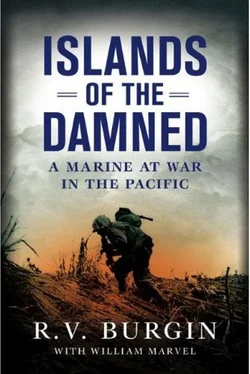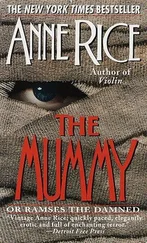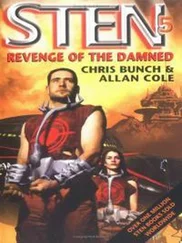During the night we were warned to watch for enemy paratroopers, but they never appeared. The Jap counterattack failed, and over the next few days we slowly began to fight our way forward again, taking heavy casualties. Our objective was a distant plateau, Dakeshi Ridge, overlooking the Awa River. From this and other ridges, the Japs had been able to fire down on our forces as they moved up along the coast.
On May 6 it started raining again, and for two days it never let up. Mud gummed up weapons everywhere along the line. Often we were setting up our mortars in a couple inches of water. Each time we fired, they sank deeper into the muck. We shored them up as best we could with boards and stones.
On May 8 we learned that the war had ended in Europe. Germany’s surrender had come too late for J.D. and for a lot of other good men. But there were no signs the Japs would follow Germany’s lead. For most of us, the end of fighting half a world away meant very little, except that maybe the flow of supplies would pick up and we’d get some help. But the Navy celebrated with a monster barrage that seemed to cut loose every gun on every ship within range of the Japs. If it did any good, you couldn’t prove it by us. We were still catching hell.
The Sixth Marine Division moved in on our right and we moved farther in from the coast, to an area called the Awacha Pocket. Except for the rain and mud, the deep draws and steep hills reminded me of Peleliu. Once again the Japs had plenty of caves and dugouts to fire from. One position covered several others, and it was almost impossible to dig them out. The roads were impassable and even amtracs could not get through to where we were set up. So they dumped our supplies a couple hundred yards away on the far side of a shallow draw. If we wanted our supplies, we had to go get them.
The business of hauling ammo, rations and five-gallon water cans across that draw got to be almost more trouble than combat itself. It was all up-and-down work. The mud would build up on your boondockers, layer by layer, so if you weren’t sinking down or sliding back into it you were tripping over yourself. To add to our troubles the Japs had discovered what we were up to and set up a Nambu machine gun at the head of that draw. Every Marine who crossed it drew fire.
I didn’t see it, but at some point Redifer took it into his head to cover our men as they went across with smoke grenades. It didn’t keep the machine gunner from firing but it spoiled his aim, and Sledge and a number of others got across safely.
Then Redifer spotted one of our tanks and ran after it. He got it stopped and pretty soon it came rumbling and clanking down into the draw, Redifer walking in front of it guiding it like one of those fellows that waves the planes into the ramp at the airport. He got the tank parked crossways in the draw, and our men resumed moving supplies across, crouching behind the tank as it rumbled back and forth. Redifer was directing all the way.
While this was going on First Lieutenant George Loveday showed up. Loveday had taken over from Legs, the lieutenant I had several clashes with. I got along a lot better with Loveday, but he wasn’t all that popular with the men. First, he just looked sloppy. His uniform never seemed to fit him right. Everything kind of hung out and dangled. A lot of the time he ran around wearing just his cloth cap, carrying his helmet tucked under his arm. When he got mad, which he did often, he’d rip off his cap and throw it down on the mud or dirt and stomp on it.
While Redifer was throwing smoke grenades, he had been standing on the side of the draw, out in the open. Loveday thought this made him an easy target, and he just reamed Redifer out, from one end to the other.
“You stupid son of a bitch,” he yelled. “Don’t you have any goddamn brains?”
Redifer just stood there in stunned silence. Then he walked off.
I don’t think Loveday had seen the whole thing. He hadn’t seen the trouble we were having getting supplies. I think what he saw was Redifer exposing himself to enemy fire without taking any precautions. It might have been a dumb way to do it. But he did get the job done.
None of this meant either man was a bad Marine. Redifer was one of those guys who wasn’t afraid of anything. He didn’t always think first. But he was solid. Loveday had his faults. He had a temper. But hell, we’ve all got our faults. He was a good man, and a good officer. After World War II, he went on for a tour of duty in Korea and then to Vietnam.
Another major push against Awacha Pocket was set for noon on May 9. The rain slacked off, the ground was drying out and our tanks were on the scene. We resupplied with ammo and registered our mortars.
Once again there was a big bombardment before we kicked off. Artillery alternated with waves of swooping Avenger dive-bombers and Corsairs firing rockets. We called the rockets “Holy Moses,” because we figured that’s what anyone on the receiving end would say when they saw them coming. I was out front, observing and directing fire. I watched our riflemen and tanks start across the valley, only to be brought up short again by Jap fire. They were using their 90mm mortars, with big shells that made a strange fluttering sound as they came tumbling down. I ordered the mortars to fire phosphorous shells to provide a smoke screen for the attack.
At the end of the day we had made maybe a few hundred yards. Our battalion was relieved and went into reserve, with orders to back up the Seventh Regiment, who were fighting on our right on Dakeshi Ridge. The Seventh hammered at that ridge all night long and just before dawn we got word that we might be needed after all. We’d picked up some intelligence that the Japs might pull a counterattack. So we pulled up stakes and moved west along the ridge to where the attack was expected. There we found a group from First and Second battalions who had fought through the night hand to hand with the Japs. Here and there, corpsmen were patching up wounded Marines. A few yards beyond their foxholes, dozens of Japs were sprawled out in the mud. We’d missed the fight.
Minutes later we were ordered to turn around and go back to our old position.
After the Seventh Marines took Dakeshi Ridge, we moved into what was left of a small village just behind the ridge. Most of the buildings were down. But the low stone walls still stood along the roads, where they provided good cover. They were well made, about three or four feet high with large stones and mortar. I ordered everyone to dig in along the north side of the walls, where we’d be sheltered from fire.
That same night I got a look at one of the new night-vision scopes the Army was using. It took two or three guys to man that thing, but they could set it up after dark and see Jap infiltrators as they moved in, before they did their dirty work. One man held the scope and the other fired a BAR at the target. I looked through it. Everything had a strange, greenish glow, but I could see like daylight. I could recognize individuals thirty to fifty yards away, actually tell who they were.
I thought, Man alive! If you had one of these things when they came at you in a banzai charge, you wouldn’t have to just fire into the dark and hope you’d hit one. You could pick them off like flies. I wondered how long until they were available for Marines.
About two o’clock in the morning, all hell broke loose over in one of our foxholes. I was only fifteen or twenty feet away and I recognized the voice. George Sarrett was yelling and thrashing around. I thought, God a-mighty! I’ve set us up where there’s a Jap cave. They’ve come out and one of them is in the foxhole with George.
I scrambled over, pulling out my KA-BAR just as Sarrett stood up, panting and sputtering.
“Get him off me!” he yelled. “God, I hate those things!”
Читать дальше











